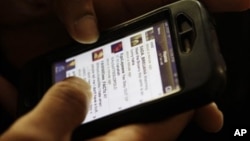This is Part Four of a five-part series on Modernizing African Banking
Continue to Parts: 1 / 2 / 3 / 4 / 5
Smartcard technologies are said to be revitalizing the development of services targeted at the youth.
Sheila Bartels-Sam, CEO of Incharge Global Ghana, says cards that deliver more than one service make subscribers versatile.
Bartels-Sam says her organization focuses on young consumers, because they easily adapt to these new technologies, and then eventually pull older people along. She says that is a good strategy for ensuring growth in Africa’s emerging economies.
“We have developed a product for a telecom company for air time dispensing,” she said, giving one example of how her company is trying to expand the utility of mobile phones.
“Once you activate the card, that’s it. You can then use the internet or mobile phone to top up [your credit]. You can also go on a Facebook page, and whilst you are chatting with your friends, you can top up. You can use your mobile phones to do any transaction that you want.”
Bartels-Sam says most of the transactions are accomplished right on the phone, through SMS, which eliminates the need to go to a service point or bank.
Along those lines, Bartels-Sam says her organization has been able to develop an easier way for rural women in the eastern Ghanaian town of Nsawam to gain access to donor funds from abroad.
The funding is aimed at helping the women buy nutritional supplements. But for women with little exposure to traditional bank accounts, it was a challenge to get the money from the organization’s account to cash in their pockets.
Bartels-Sam said that problem has essentially been solved with mobile money transfers. “Women were given mobile phones with money transfer applications,” she said. “When the [donor] disburses the funds, it immediately hits their phones, and then there is a local financial service where they can go and cash out.”
Speaking at a recent technology and banking conference in Accra, the businesswoman said her organization focuses on delivering industry- and problem-based solutions.
“We look at, for instance, health care problems, we look at education problems. How do you deliver services to people in the rural areas who are illiterate? We deliver solutions that run on cards.”
She says these solutions will be useful not only for Ghana, but for Africa as a whole.
Continue to Parts: 1 / 2 / 3 / 4 / 5
Smartcard technologies are said to be revitalizing the development of services targeted at the youth.
Sheila Bartels-Sam, CEO of Incharge Global Ghana, says cards that deliver more than one service make subscribers versatile.
Bartels-Sam says her organization focuses on young consumers, because they easily adapt to these new technologies, and then eventually pull older people along. She says that is a good strategy for ensuring growth in Africa’s emerging economies.
“We have developed a product for a telecom company for air time dispensing,” she said, giving one example of how her company is trying to expand the utility of mobile phones.
“Once you activate the card, that’s it. You can then use the internet or mobile phone to top up [your credit]. You can also go on a Facebook page, and whilst you are chatting with your friends, you can top up. You can use your mobile phones to do any transaction that you want.”
“We look at, for instance, health care problems, we look at education problems. How do you deliver services to people in the rural areas who are illiterate? We deliver solutions that run on cards.”CEO Shiela Bartels-Sam
Bartels-Sam says most of the transactions are accomplished right on the phone, through SMS, which eliminates the need to go to a service point or bank.
Along those lines, Bartels-Sam says her organization has been able to develop an easier way for rural women in the eastern Ghanaian town of Nsawam to gain access to donor funds from abroad.
The funding is aimed at helping the women buy nutritional supplements. But for women with little exposure to traditional bank accounts, it was a challenge to get the money from the organization’s account to cash in their pockets.
Bartels-Sam said that problem has essentially been solved with mobile money transfers. “Women were given mobile phones with money transfer applications,” she said. “When the [donor] disburses the funds, it immediately hits their phones, and then there is a local financial service where they can go and cash out.”
Speaking at a recent technology and banking conference in Accra, the businesswoman said her organization focuses on delivering industry- and problem-based solutions.
“We look at, for instance, health care problems, we look at education problems. How do you deliver services to people in the rural areas who are illiterate? We deliver solutions that run on cards.”
She says these solutions will be useful not only for Ghana, but for Africa as a whole.





